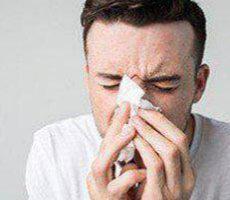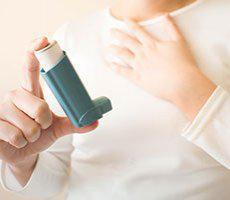What causes asthma?
Asthma is a chronic condition in which the airways in your lungs become hypersensitive and inflamed. When you have an asthma attack, three things happen that narrow your airways and make it hard to breathe:
- Small airways in your lungs become swollen
- Muscles lining the airways tighten
- Extra mucus is produced that further clogs your airways
Once you develop asthma, your airways remain inflamed, which makes you more susceptible to future asthma attacks.
What triggers an asthma attack?
Although each patient has their own group of asthma triggers, some of the most common include:
- Cold air
- Tobacco smoke
- Air pollution
- Certain odors and chemical fumes
- Stress and strong emotions
- Upper respiratory infections
Physical activity is another common trigger. It’s estimated that 90% of all patients with asthma experience exercise-induced bronchoconstriction. Dr. Tolston can help you stay active with proper treatment.
What is allergic asthma?
Allergic asthma is the most common type of asthma. You have allergic asthma when your asthma is triggered by allergies. Although allergic asthma is usually due to airborne substances, such as pollen, the allergens that trigger skin or food allergies can also cause asthma.
What symptoms will I develop due to asthma?
The symptoms of asthma include:
- Shortness of breath
- Wheezing
- Chest tightness
- Chest pain
- Coughing
When your cough is due to asthma, you won’t get relief from an over-the-counter cough medicine.
If you have cough-variant asthma, the only symptom you’ll develop is a dry, chronic cough. This type of asthma, which is more common in children, is often triggered by allergies.
How is asthma treated?
Following a comprehensive review of your medical history and a physical exam, Dr. Tolston determines whether you have asthma by performing lung function tests in the office.
When allergic asthma is suspected, Dr. Tolston also determines your specific allergens with allergy testing. Immunotherapy to treat your allergies will also significantly improve your asthma.
When you have asthma, it’s important to identify your triggers so that you can avoid them as much as possible. Medical treatments for asthma include:
Quick-relief medication
Quick-relief medications are delivered via an inhaler or by using a device called a nebulizer, which converts your medication into a fine mist that you can inhale. This treatment is used to quickly open your airways during an asthma attack.
Long-term asthma control medications
Dr. Tolston may prescribe daily medication to reduce inflammation in your airways, keep your asthma under control, and prevent future flare-ups.
When you experience difficulty breathing, or you develop wheezing or a cough, call Allergy Asthma and Immunology on Madison or book an appointment online.








